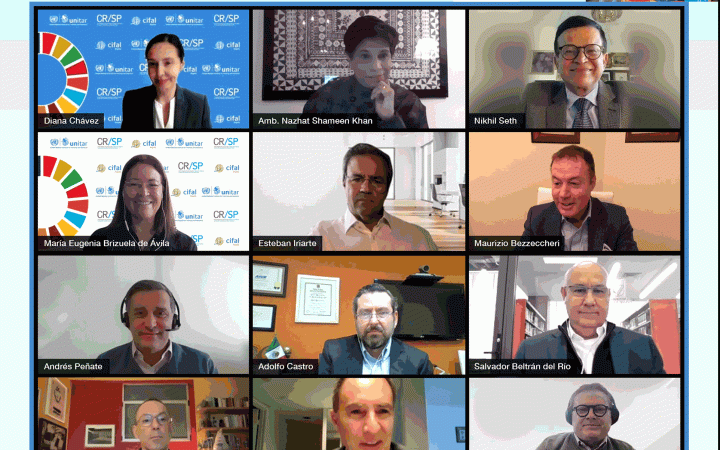February 2022, Geneva, Switzerland - The Private Sector Regional Centre for support of the United Nations Sustainable Development Goals (CR/SP) and CIFAL Bogota along with the United Nations Institute for Training and Research (UNITAR) hosted a high-level virtual conversation called “A Conversation with CEOs & Leaders” on Tuesday, 8 February 2022. For this session, the topic was “Human Rights: a pillar for Corporate Strategy & the 2030 Agenda”.
The platform “A Conversation with CEOs & Leaders” aims to facilitate dialogue among decision-makers of the international agenda and engagement in business intelligence to benchmark global corporate practices. Under its mandate to foster a corporate commitment to development, the Private Sector Regional Centre for Support of UN Sustainable Development Goals (CR/SP, for its acronym in Spanish) provides a platform to benchmark practical experiences among decision-makers and promote avant-garde practices in sustainability and business competitiveness. The event is by invitation only, with a selected group of CEOs and leaders discussing a pre-selected topic. It was moderated by Ms. Diana Chávez, CR/SP Executive Director.
The moderator, thanked Mr. Nikhil Seth, Executive Director of UNITAR, and H.E. Ambassador Nazhat Shameem Khan from Fiji, acknowledging that “It is a pleasure to moderate such a high-level conversation with a diverse group of industry leaders, including Enel, Tigo Millicom, Ab Inbev and Asur and facilitate a platform that strengthen the partnership between the private sector and the human rights council”.
Mr. Nikhil Seth officially commenced the insightful discussions with an opening statement “As we kick off this dialogue, I wanted to reflect on ways we can work together for a better recovery by promoting rights and focusing on certain aspects. First, the challenges that the Latin American region faces will require that the private sector engages the society further, through greater responsible business conduct and inclusive sustainable practices. The key aspect of the promotion of human rights is strengthening the capacity of stakeholders, especially companies to implement due diligence to identify, prevent and tackle the negative impacts on human rights, create decent work opportunities and protect the environment. Our goal is that this dialogue will serve as a launching path for continued dialogue and exchange of experiences.”
It was followed by special remarks by Ambassador Nazhat Shameem Khan, United Nations Human Rights Council outgoing President, who acknowledged that the guiding principles are essential in strengthening the partnership between the private sector and the human rights council. “There are three main principles: Protect, respect and remedy. The responsibility of the state is to protect people from breaches of human rights, but it is the responsibility of the private sector, companies, and corporations to promote respect for human rights in the way that they govern themselves. And together both states and companies must ensure that they provide remedies for breaches of human rights.”
It was later proceeded by interventions from CEOs and leaders who have exemplified how corporate actors can use their capacities to take a more active role on social factors. The open dialogue provided many valuable insights on how companies can make a stronger impact on the decisions they make, their responsibilities from a corporate respective to embed human rights and find ways on measuring risks. This platform gave the participants an opportunity to share certain gaps in public and corporate frameworks that still need to be addressed in the overall company decision-making process. Integrating human rights at every level of a company’s work is essential.
In closing, Ms. Diana Chávez, highlighted three recommendations for a practical contribution to human rights and the 2030 Agenda: “First, to strengthen corporate governance and position human rights as strategic in the company boards. Second, to invest in capacity building in human rights, from the Suite C to the operative level. Lastly, incorporate due diligence in human rights and sustainability when engaging in public-private partnerships as this contributes to building a stronger social fabric by fostering resilient communities.”


